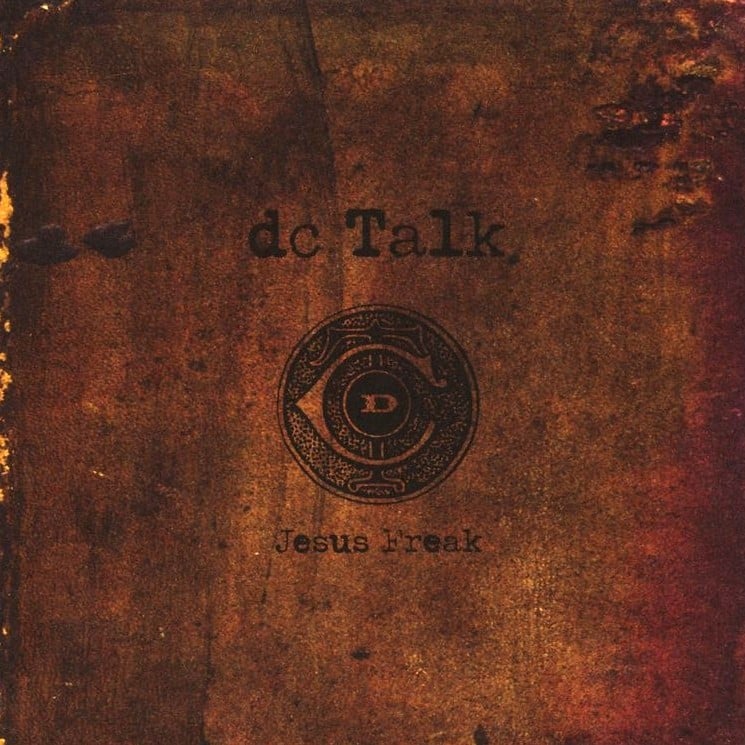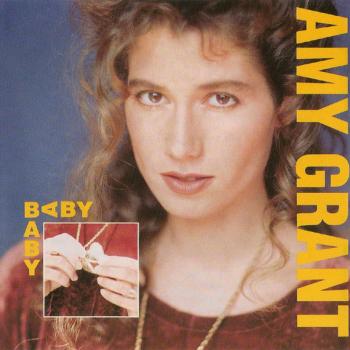The CCM Canon is an ongoing feature in which I discuss some of the most beloved and popular songs from Christian music history∗. Today, we’re talking about dc Talk’s “Jesus Freak.”

If you were a kid entrenched in youth group culture in the mid-90s, dc Talk was your Nirvana, and “Jesus Freak” was your “Smells Like Teen Spirit.”
Like many evangelical kids, I was only allowed to listen to Christian music. Anything with the dreaded label “secular” was believed to immediately flip a switch that turned clean-cut Baptist boys into puppy-punching delinquents. My parents considered Kurt Cobain as dangerous as their parents probably thought John Lennon had been, and the band’s Nevermind — with its cover featuring a photo of a naked baby — was definitely one destined for the firepit.
I didn’t mind. I embraced the idea that Christian music was safer, more God-honoring and superior to anything produced by the heathens at Tower Records. I could just go to my local Family Christian Store and find the “sounds like” poster to discover which band married the grunge aesthetic with sanctified lyrics. The band was dc Talk, a trio of dudes from the epicenter of evangelical coolness, Liberty University. That is, unless the menu was out of date and still compared dc Talk to DJ Jazzy Jeff and the Fresh Prince.
Decent Christian Talk
Before we get into “Jesus Freak,” let’s set some context. dc Talk didn’t emerge in 1995 as a Nirvana-aping alt rock group. My first exposure to them was actually in 1989, when their “Heavenbound” video debuted on a Degarmo and Key VHS. I can’t remember a single song by Degarmo and Key, but I know I watched “Heavenbound” on a loop. And it definitely was not a grunge tune.
Yes, dc Talk started a hip-hop trio, its moniker signifying “decent Christian talk.” Toby McKeehan was the front man, Michael Tait brought in some R&B styling, and Kevin Max contributed a rock background. The first album features Michael and Kevin in largely background roles while Toby spits rhymes. As the band grew in popularity, that first album gained a reputation as a bit of an embarrassment (maybe it was the rap version of “Jesus Loves Me”), but I dug it. It was a Christian album produced in the early days of hip-hop, and I played it to death.
The band added to its repertoire as albums continued. Nu Thang is still heavy on the pop and hip-hop (and even includes a jam called “I Luv Rap Music”), but Free At Last is the ultimate evolution of their self-described “rap, rock and soul” sound. dc Talk quickly established itself as one of the more talented Christian groups, getting play on mainstream radio and MTV. Yes, the lyrics were didactic and, at times, corny (there’s no way to make a song about abstinence sound cool, but yeesh…), but there was no denying the talent, energy and fun the mix brought. Which is why they shocked fans when they decided to blow it up.
I’ve Got Somethin’ For Ya, Man
The Jesus Freak album dropped in November 1995. It was a weird period for music; when Jesus Freak hit its peak, 16th on the Billboard 200, the top album in the country was the Beatles’ Anthology 1 and the top 50 included Cypress Hill, Boyz II Men, Alanis Morrissette, Hootie and Blowfish, and Silverchair. The top Christian albums were Michael W. Smith’s I’ll Lead You Home and Steven Curtis Chapman’s The Music of Christmas.
And so, dc Talk’s fourth album felt like something fresh, more in line with what the kids in school were listening to than the mom rock heating up the CCM charts. It was a new direction for the band. There were no playful poses on the album cover; instead, just what looked like scratched brown parchment with a cryptic logo. The album didn’t start with danceable beats like “When dc Talks” or “Luv is a Verb.” It begins with a somber guitar intro and then Toby’s voice growling “I’ve got something for ya, man,” like a drug dealer, before the guitars shred and “So Help Me God” takes over.
I was initially taken aback. This wasn’t the funky beats of Nu Thang or the playful hip-hop of Free at Last. The majority of the songs featured little to no rapping at all. Kevin and Michael took over the vocal leads; Toby’s rapping was often a bonus. The guitars were loud, almost angry. Some songs were pensive and melancholy. Today, I consider Jesus Freak one of the great CCM albums, but when it first released, I had no idea what to make of it. But I did know that, as much as the new direction bothered me, the title track flat-out killed.
There ain’t no disguising the truth
The first thing to stand out about “Jesus Freak” was its sound, and I can’t stress how out of the norm that was when listening to Christian music. A theme I’m sure we’ll hit back on over and again in these columns is how I was taught that lyrics were everything in music; that’s why it was so important to have Christian music. In theory, they could duplicate the sounds on secular radio but make sure the words were safe and sanctifying.
“Jesus Freak” opens with a driving drum beat, before the guitars burst in and the band starts screaming in the background. I couldn’t believe this was the same band that I’d last heard perform a hip-hop version of “Lean on Me.” The song felt epic, alternating between Michael’s rich voice, Toby’s screamed rap verses and Kevin’s brooding bridge. Couple that with a grimy, edgy music video, and this was a song planting a flag to say “Christian music can sound just like everything else.”
What will people think?
Which, let’s be honest, is also one of the criticisms. Christian music is often derided as the diet version of secular music, hence the “if you like this, listen to this” wall at Bible bookstores. And dc Talk had a canny ability to shift styles and appropriate trends. Their hip-hop albums mimic Sugar Hill and other artists, and Jesus Freak often feels like a calculated attempt to woo the Seattle crowd. Their final album, Supernatural, would shift again, with a mix of U2-esque stadium rock, pop-punk, and funk numbers.
But even if it is mimicry, it’s good mimicry. It might be a touch overproduced, but I’d put the sound of “Jesus Freak” up there with anything on the radio, and the band was doing the alt rock/rap combo before Fred Durst was (briefly and regrettably) a household name. I’m sure there was definitely some calculation about hitting the popular market.
But I think it’s equally possible that young artists were influenced by what they were listening to. Just as Toby wanted to make a Christian album that sounded like Sugar Hill, I think it’s plausible that three men in the ‘90s wanted to do something influenced not just by their contemporary heroes but by the music they grew up with and the people who influenced them. This explains the album’s use of a song from Godspell, a reworking of Charlie Peacock’s “In the Light,” and vocal cameos from Billy Graham and Brennan Manning. There are reasons to be cynical about Christian music, and I don’t want to discount the calculation. But I think it’s also possible that three skilled artists just turned out a pretty fantastic-sounding song.
Does it make me a stranger that my best friend was born in a manger?
But, as I said, Christian music didn’t just emphasize the sound; lyrics counted. And “Jesus Freak” became an anthem because it spoke to kids who often felt out of place with their peers. I recall those See You at the Pole days where I’d pray for my friends outside the school and feel my classmates judging me. I still feel the embarrassment of telling people I wasn’t going to the high school musical or dance because I had a youth group activity. And I blush when I recall the reactions people had to my views on alcohol, R-rated movies and sex.
To that, dc Talk offered a song saying we weren’t alone. If we were sold out for God (the band was quick to remind fans in interviews that “freak” meant “ardent enthusiast”), we might look weird but we were in the company of John the Baptist and a long line of preachers, martyrs and missionaries. We shouldn’t be ashamed when the world looks at us weird; we should embrace the fact that our commitment to Christ is so noticed by the rest of the world.
The lyrics resonated with me when I felt out of place and tempted to be ashamed of my faith. It told me it was okay to be a fan of Jesus, that my enthusiasm was normal and placed me in good company. I imagine it’s what comic book readers fans felt upon finding message boards before Marvel became a culture-dominating force. It told me it was okay to go all-in on the faith; and that’s not a bad thing. Except when it is.
I don’t really care if they label me a Jesus Freak
I think “Jesus Freak” is a good song. It slaps, as the kids say. I still crank it when I hear it. But it had an unintended and problematic side effect, in that it positioned persecution as a badge of honor. When the band asked “what will people think,” it implied that people did think oddly of you. It tied in with Christians’ habit of clinging to Jesus’ words to be blessed when people revile, curse and persecute you. And it sent us looking for persecution everywhere.
The truth is, I went through most of high school convinced that people were calling me a Jesus Freak, but I don’t know how much of that is true. Sure, people rolled their eyes when I said drinking was wrong or that they shouldn’t have sex before marriage; but were they actually mocking me? It’s possible I already had a chip on my shoulder because of youth leaders who told me that my classmates would never accept what I believe. I was looking for persecution to validate my faith. Even worse, it’s likely I was already on the offensive, a judgmental little twerp who wasn’t being persecuted so much as being dismissed because of his own self-righteousness.
“Jesus Freak” positioned a generation to believe that any declaration of faith would be met by hostility. The album was accompanied by a book about martyrs, implying that the mean names we were called put us in the same company as those burned at the stake. It perpetuated an attitude that it was us against the world, that we needed to stand against the unbelievers, and that anyone who didn’t believe in Christ was our enemy. I can see its legacy in the vitriol we see in evangelicals who rail against perceived government oppression or manage to find persecution around every corner. I don’t think it’s the intended legacy of dc Talk, but I think it needs to be recognized and discussed.
There ain’t no disguising the truth
One of the reasons I started the Jesus Junkyard was to reconcile the changes to my faith with the headstrong, sold-out youth group kid of the ‘90s. And dc Talk was ground zero for that kid. They were the band whose sound I embraced, and whose lyrics challenged me. I didn’t see Green Day play until I was 30 years old; I saw dc Talk in concert four times by the time I turned 20. They were crucial to my teenage identity and my first steps in making my faith my own.
So, it is heartening to go back and listen to “Jesus Freak” (the song and the album) and find that it’s aged better than much of what I was listening to as a teen. And yet, I still can recognize seeds in that culture that brought out the worst in me and, ultimately, gave birth to things in evangelicalism that deeply disturb me. That’s fine; our relationship to art changes as we age. After all: I still love Fight Club, but I see Tyler Durden a bit more clearly now than I did in my twenties.
I’m sure we’ll hit dc Talk again a few more times in this series, and we’ll talk about the trio’s varied solo careers. But they were never bigger or better than “Jesus Freak,” and the song may be the most iconic Christian song of an entire generation.












